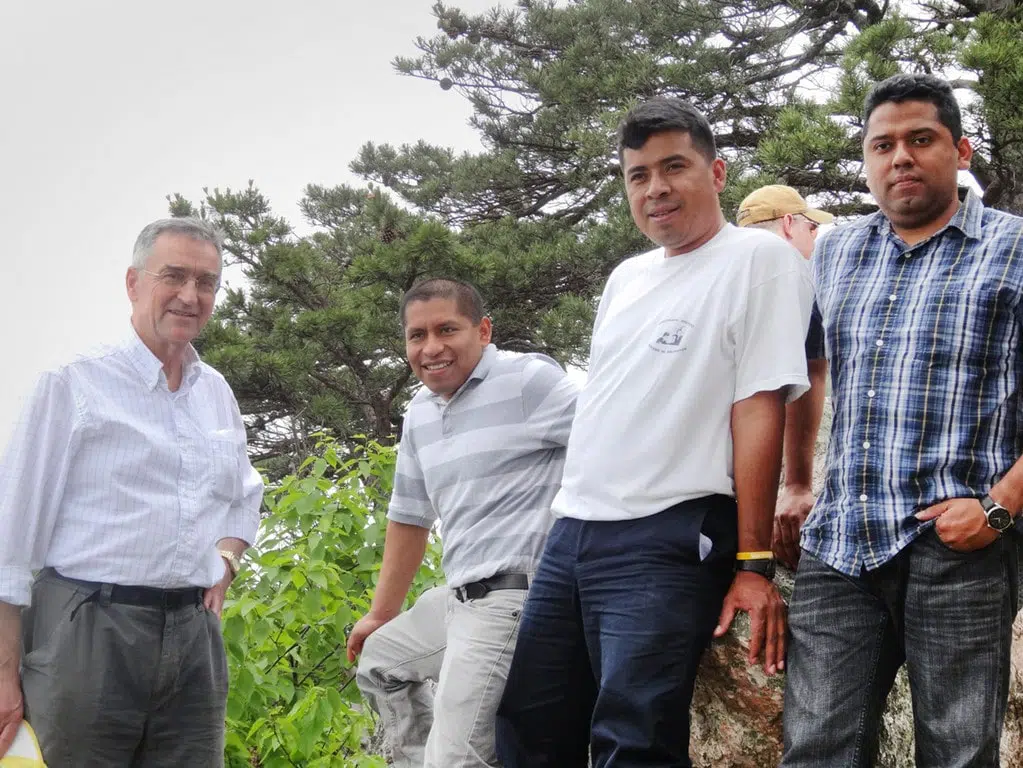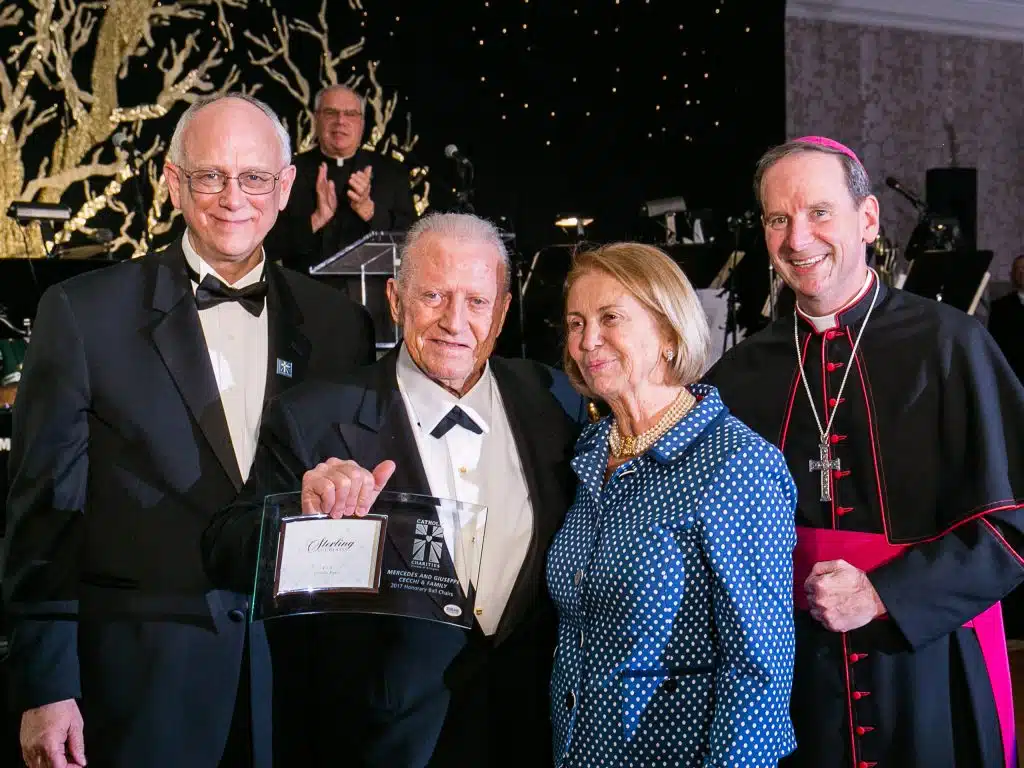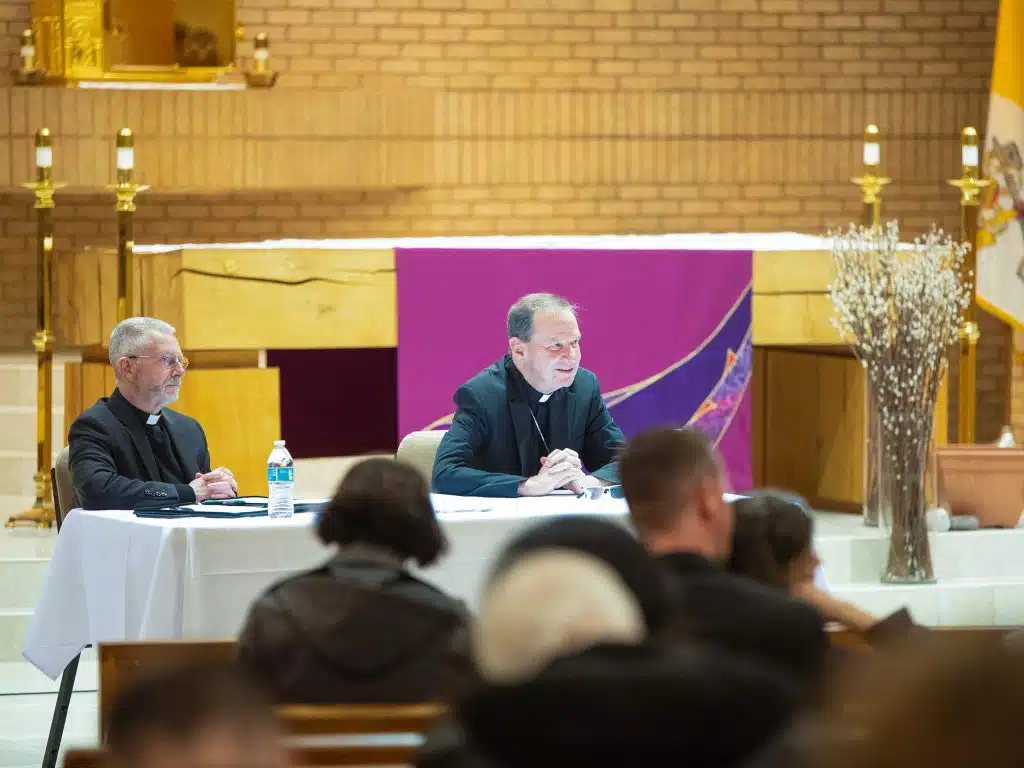“Silence is a vehicle for finding God,” said Antonio
Pérez-Alcalá in Spanish. “It’s not the only
path, but people cannot mature in their faith without
silence. It is a profound part of spiritual life.”
But he didn’t always think so. By his own admission, there
once was a time in his life when he gave little thought to
his faith at all.
Today, Pérez-Alcalá is a consecrated layman at
McLean’s Stabat Mater, a secular Marian institute founded by
Father Tomás Morales Pérez in Madrid. But once
he was an engineering student who was completely unaware that
his life was about to change on an otherwise ordinary day
walking down the streets of Madrid.
Pérez-Alcalá said it was the early 1960s when
he was 19 or 20 and a man stopped him to ask if he was
Catholic. He said, “Yes,” but today he says it was simply
because “everyone in Spain was Catholic.” Though he had
attended Catholic school and went to weekly Mass with his
parents, he described himself and his family as “good people”
but “weekly Catholics” who were not very involved in the
church. So when this stranger invited
Pérez-Alcalá to join the Crusaders of St. Mary
for a youth retreat in the mountains, he accepted mostly out
of curiosity.
“We camped there and I saw the stars, and I had a religious
experience,” he said. “It was shocking. It was something
special.”
It was there in the mountains that he appreciated the value
of silence, which is a key component of Stabat Mater’s
spirituality, along with an emphasis on spending time in
nature with God’s creation.
Soon Pérez-Alcalá was joining the group
regularly.
“Every weekend, we went back to the mountains,” he said. “It
was summer and beautiful out, but this was not a matter of
sports. The trip was always spiritual.”
Soon Pérez-Alcalá became more and more involved
in the Catholic Church. A year after that first mountain
retreat, he told his parents that he was moving to the Stabat
Mater residence. Until that point, he had lived at home and
commuted to college, so the announcement displeased and
confused them. Since the residence was only one mile from the
family home, they thought the move was impractical.
“(Laymen) usually don’t live together in a community, but we
did,” Pérez-Alcalá said. “It took several years
for my parents to understand and for us to renew our
relationship, but I had a clear idea of what I wanted.”
He began commuting from the residence to college and
continued to do well in his engineering program. Following a
discernment period, he took his lay consecrated vows of
poverty, chastity and obedience. Eventually, his parents’
confidence in his decision grew. After
Pérez-Alcalá graduated, he began his career as
an engineer while continuing to live in the community.
Pérez-Alcalá went on to live in Stabat Mater
communities in Salamanca, Burgos and Zaragoza before he was
assigned to the Washington area in 1993. After he left
Madrid, he no longer worked as an engineer, instead
dedicating himself fully to Stabat Mater as a leader of
spiritual exercises for young people.
He jokes that leaving the engineering field makes him less
than the “genuine article” as a member of the institute. Per
the institute’s mission, members must “aspire to reach
holiness in the world, without leaving the temporal realities
and professions in which we live.” Typically, members stay in
their chosen profession and evangelize co-workers and anyone
else with whom they are in contact. Yet after
Pérez-Alcalá had worked as an engineer for five
years, the institute needed a youth spirituality director,
and he felt called to service.
“It’s a vocation because not everyone can do it,” he said.
“It’s hard to work with young people, especially teenagers.”
Despite the challenges, he says he reaps a great reward.
“There is joy in watching (youths) grow in their Christian
life,” he said, adding that it makes him happy to watch them
develop a relationship with Christ. In them, he sees the
future of the church.
The silent retreat is one of his favorite spiritual
exercises. During half-day and full-day retreats,
participants must remain completely silent and spend their
time thinking, praying or reading spiritual texts. The aim is
to foster contemplation.
“There’s this misconception that young people are all about
noise and music and chatter, but the truth is that they
really like the silent retreats,” Pérez-Alcalá
said. “They have to prepare for them, but they like them.”
While the Stabat Mater Institute was not founded on
encouraging religious vocations, Pérez-Alcalá
said many of the boys and girls he has worked with have
entered the priesthood or consecrated life.
“We try to direct everybody according to what God wants for
them,” he said.
Today there are four men in residence at Stabat Mater in
McLean, all of whom are Hispanic and native Spanish speakers.
As a result, the youths they serve are all Hispanic, though
they speak varying degrees of Spanish since many were raised
in the United States. Pérez-Alcalá said he is
especially called to serve youths whose families have been
“fractured” by immigration and the stresses of making a life
in a new country.
“Our founder’s idea was that first we would serve Spain and
Hispanic America,” said Pérez-Alcalá. “Second
would come the rest of the world. Since we are young as an
institute, we are still working on that second part.” He
added that though he wishes people from more diverse
backgrounds were involved with Stabat Mater, the community is
“so busy with Hispanics,” that there has been little
opportunity to extend outreach to other cultures.
But he finds working with fellow Hispanics – whether in
retreats or pilgrimages – very fulfilling, describing
Hispanics on the whole as “very religious” and
“heart-warming” people. He does not view the differences
among the Hispanic cultures – whether Spanish or Salvadoran –
as barriers.
“We are not Hispanic Catholic. We are Catholic Hispanic. The
most important (part of our identity) is our faith, (not our
country of origin),” he said.
Stoddard is a freelance writer in Arlington.



